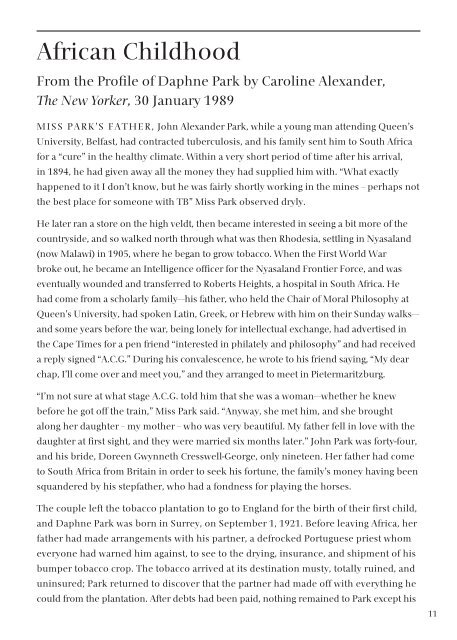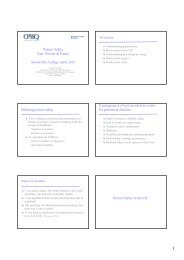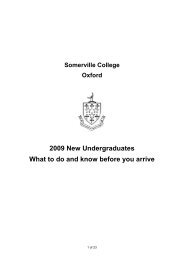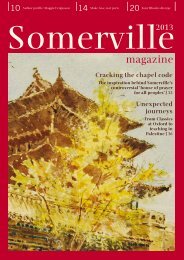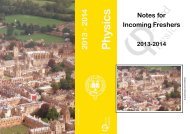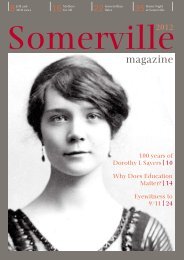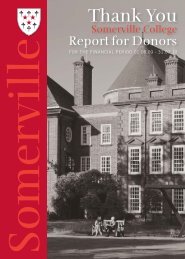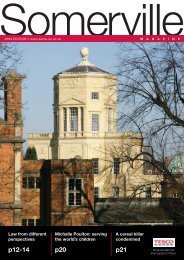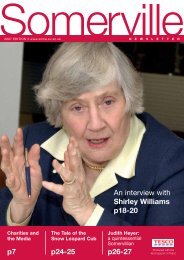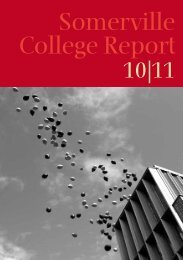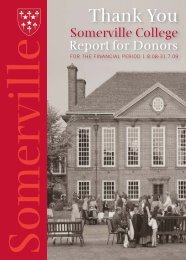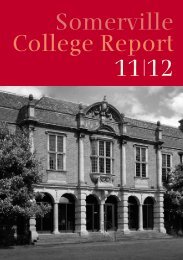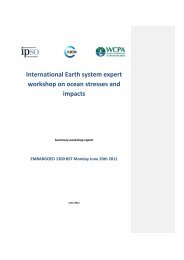Daphne Park Memorial book 3_3.indd - Somerville College
Daphne Park Memorial book 3_3.indd - Somerville College
Daphne Park Memorial book 3_3.indd - Somerville College
You also want an ePaper? Increase the reach of your titles
YUMPU automatically turns print PDFs into web optimized ePapers that Google loves.
African ChildhoodFrom the Profile of <strong>Daphne</strong> <strong>Park</strong> by Caroline Alexander,The New Yorker, 30 January 1989MISS PARK’S FATHER, John Alexander <strong>Park</strong>, while a young man attending Queen’sUniversity, Belfast, had contracted tuberculosis, and his family sent him to South Africafor a “cure” in the healthy climate. Within a very short period of time after his arrival,in 1894, he had given away all the money they had supplied him with. “What exactlyhappened to it I don’t know, but he was fairly shortly working in the mines – perhaps notthe best place for someone with TB” Miss <strong>Park</strong> observed dryly.He later ran a store on the high veldt, then became interested in seeing a bit more of thecountryside, and so walked north through what was then Rhodesia, settling in Nyasaland(now Malawi) in 1905, where he began to grow tobacco. When the First World Warbroke out, he became an Intelligence officer for the Nyasaland Frontier Force, and waseventually wounded and transferred to Roberts Heights, a hospital in South Africa. Hehad come from a scholarly family—his father, who held the Chair of Moral Philosophy atQueen’s University, had spoken Latin, Greek, or Hebrew with him on their Sunday walks—and some years before the war, being lonely for intellectual exchange, had advertised inthe Cape Times for a pen friend “interested in philately and philosophy” and had receiveda reply signed “A.C.G.” During his convalescence, he wrote to his friend saying, “My dearchap, I’ll come over and meet you,” and they arranged to meet in Pietermaritzburg.“I’m not sure at what stage A.C.G. told him that she was a woman—whether he knewbefore he got off the train,” Miss <strong>Park</strong> said. “Anyway, she met him, and she broughtalong her daughter – my mother – who was very beautiful. My father fell in love with thedaughter at first sight, and they were married six months later.” John <strong>Park</strong> was forty-four,and his bride, Doreen Gwynneth Cresswell-George, only nineteen. Her father had cometo South Africa from Britain in order to seek his fortune, the family’s money having beensquandered by his stepfather, who had a fondness for playing the horses.The couple left the tobacco plantation to go to England for the birth of their first child,and <strong>Daphne</strong> <strong>Park</strong> was born in Surrey, on September 1, 1921. Before leaving Africa, herfather had made arrangements with his partner, a defrocked Portuguese priest whomeveryone had warned him against, to see to the drying, insurance, and shipment of hisbumper tobacco crop. The tobacco arrived at its destination musty, totally ruined, anduninsured; <strong>Park</strong> returned to discover that the partner had made off with everything hecould from the plantation. After debts had been paid, nothing remained to <strong>Park</strong> except his11


